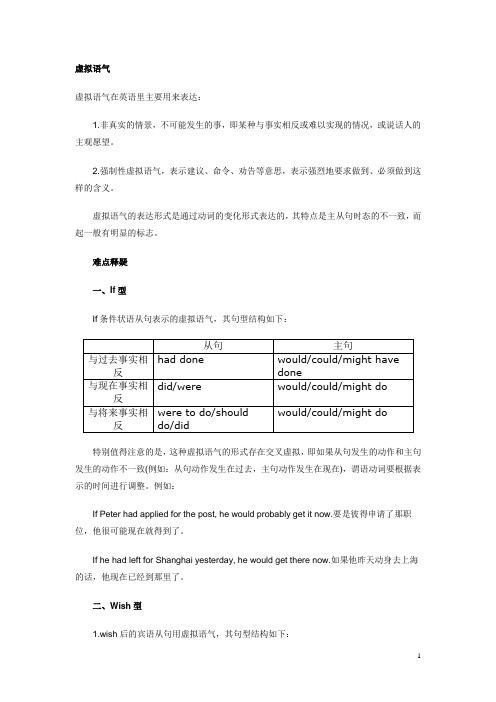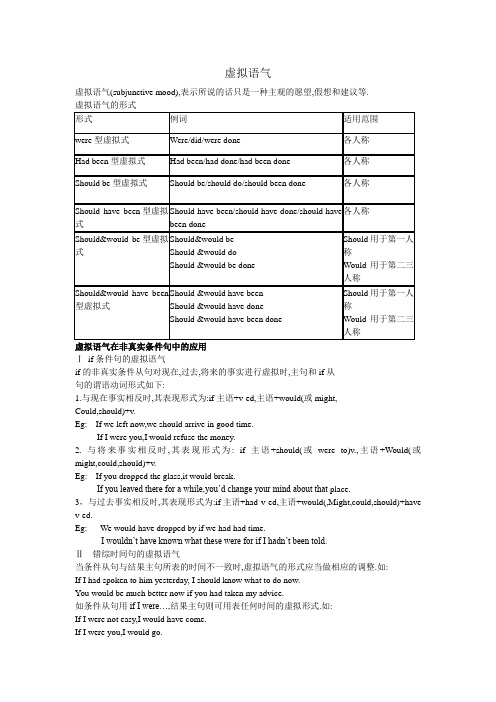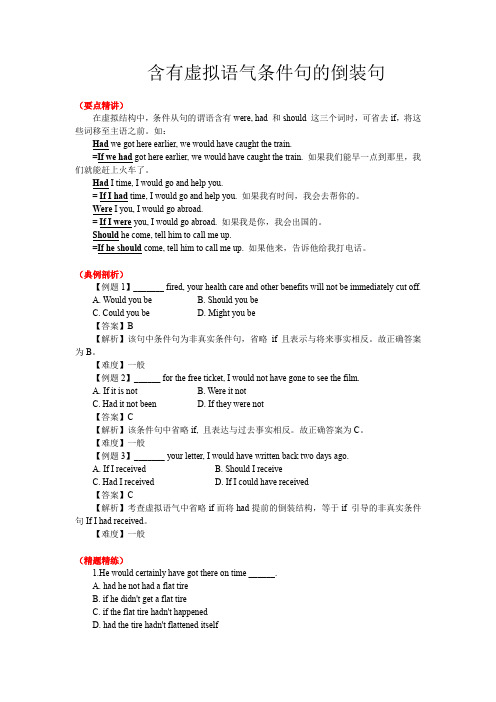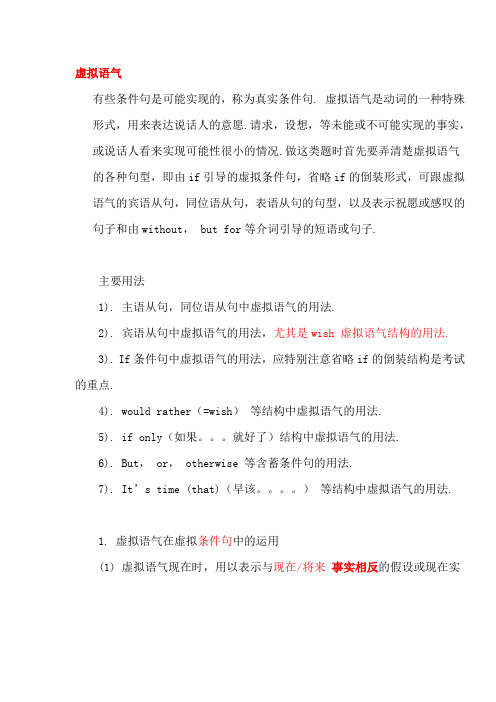虚拟语气的倒装形式
语法:虚拟语气和倒装句

虚拟语气虚拟语气在英语里主要用来表达:1.非真实的情景,不可能发生的事,即某种与事实相反或难以实现的情况,或说话人的主观愿望。
2.强制性虚拟语气,表示建议、命令、劝告等意思,表示强烈地要求做到、必须做到这样的含义。
虚拟语气的表达形式是通过动词的变化形式表达的,其特点是主从句时态的不一致,而起一般有明显的标志。
难点释疑一、If型If条件状语从句表示的虚拟语气,其句型结构如下:特别值得注意的是,这种虚拟语气的形式存在交叉虚拟,即如果从句发生的动作和主句发生的动作不一致(例如:从句动作发生在过去,主句动作发生在现在),谓语动词要根据表示的时间进行调整。
例如:If Peter had applied for the post, he would probably get it now.要是彼得申请了那职位,他很可能现在就得到了。
If he had left for Shanghai yesterday, he would get there now.如果他昨天动身去上海的话,他现在已经到那里了。
二、Wish型1.wish后的宾语从句用虚拟语气,其句型结构如下:与过去事实相反wish that 从句的谓语动词用had done与现在事实相反wish that 从句的谓语动词用did与将来事实相反wish that 从句的谓语动词用would/could do例如:I wish they would change the menu.他们要是改变一下菜单就好了。
I wish I hadn’t spent so much money.我要是没花那么多的钱就好了。
同样地,在as if/as though引导的宾语从句中和以if only引导的带有感叹色彩的虚拟语气句子中,谓语动词与wish引导的宾语从句中的虚拟形式相同。
2.由if only 引导的虚拟语气与过去事实相反if only 谓语动词用had done与现在事实相反if only 谓语动词用did例如:If only she had asked someone’s advice! 她要是征求了别人的意见就好了!3.由as if/as though 引导的虚拟语气与过去事实相反as if/as though谓语动词用had done与现在事实相反as if/as though谓语动词用did例如:He talks about Rome as if he had been there himself.谈论起罗马来就像他去过似的。
虚拟语气

If it snowed/were to snow/should snow tomorrow,we could change our plan.
如果明天下雪,我们会改变计划。
将来
二、虚拟语气的倒装形式
1)If it had not been for your help,we would never have been able to get out of trouble. → Had it not been for your help,we would never have been able to get out of trouble. 2)If it should snow tomorrow,we would put off our trip. → Should it snow tomorrow,we would put off our trip. 3)If I were you,I would buy that car. → Were I you,I would buy that car.
他立刻去老师的办公室很有必要。
增:
现在的事实 If it were not for the fact that you are ill,I would ask you to do this right now.
如果不是你病了,我会让你立刻做这件事。
If he had followed my advice,he wouldn’t 过去 have lost his job.
如果他听了我建议,他不会失去他的 工作。
情况3:与将来事实相反
If sb. did/were to do/should do …,sb. would/could/might do.
虚拟语气倒装讲义

Ⅴ虚拟语气在in case,lest或for fear that等从句中的用法
in case,lest或for fear that引起的从句常用虚拟语气,表示“以防,以免”,形式为should+动词原形,should通常不能省略.
1.I finally got the job I dreamed about.Never in my life___
so happy!(2000,spring)
A did I feel B Ifeel C I had felt D had I felt
2.The old couple have been married for 40 years and never once__with each other.(2003)
主语+be+adj.+that+主语+should+动词原形
主语+be+adj.+that+主语+should have+过去分词
Eg :I am happy that he should agree.
I am ashamed that you should have done such a thing.
Eg :He took his raincoat with him in case it should rain.
The young driver looked over the engine carefully lest it should go wrong on the way.
Ⅵ虚拟语气在形容词短语的that宾语从句中的应用
含有虚拟语气的倒装句

含有虚拟语气条件句的倒装句(要点精讲)在虚拟结构中,条件从句的谓语含有were, had 和should 这三个词时,可省去if,将这些词移至主语之前。
如:Had we got here earlier, we would have caught the train.=If we had got here earlier, we would have caught the train. 如果我们能早一点到那里,我们就能赶上火车了。
Had I time, I would go and help you.= If I had time, I would go and help you. 如果我有时间,我会去帮你的。
Were I you, I would go abroad.= If I were you, I would go abroad. 如果我是你,我会出国的。
Should he come, tell him to call me up.=If he should come, tell him to call me up. 如果他来,告诉他给我打电话。
(典例剖析)【例题1】_______ fired, your health care and other benefits will not be immediately cut off.A. Would you beB. Should you beC. Could you beD. Might you be【答案】B【解析】该句中条件句为非真实条件句,省略if且表示与将来事实相反。
故正确答案为B。
【难度】一般【例题2】______ for the free ticket, I would not have gone to see the film.A. If it is notB. Were it notC. Had it not beenD. If they were not【答案】C【解析】该条件句中省略if, 且表达与过去事实相反。
(完整版)虚拟语气倒装(讲解+练习)

虚拟语气有些条件句是可能实现的,称为真实条件句. 虚拟语气是动词的一种特殊形式,用来表达说话人的意愿.请求,设想,等未能或不可能实现的事实,或说话人看来实现可能性很小的情况.做这类题时首先要弄清楚虚拟语气的各种句型,即由if引导的虚拟条件句,省略if的倒装形式,可跟虚拟语气的宾语从句,同位语从句,表语从句的句型,以及表示祝愿或感叹的句子和由without, but for等介词引导的短语或句子.主要用法1). 主语从句,同位语从句中虚拟语气的用法.2). 宾语从句中虚拟语气的用法,尤其是wish 虚拟语气结构的用法.3). If条件句中虚拟语气的用法,应特别注意省略if的倒装结构是考试的重点.4). would rather(=wish)等结构中虚拟语气的用法.5). if only(如果。
就好了)结构中虚拟语气的用法.6). But, or, otherwise 等含蓄条件句的用法.7). It’s time (that)(早该。
)等结构中虚拟语气的用法.1. 虚拟语气在虚拟条件句中的运用(1) 虚拟语气现在时,用以表示与现在/将来事实相反的假设或现在实现可能性不大的情况.Eg. If I were a bird, I would fly to you.If it is not for their help, we shall be in a very difficult position.If it were not for their help, we should be in a very difficult position.If I had seen the film, I would…..(2) 虚拟语气过去式. 表示与过去事实完全相反的假设.Eg. If we had started earlier, we should not have missed the train.If she hadn’t been ill, she might have come.If she were not ill, she might come.◆书面语中,如果从句里含有should, had, were或其他助动词,则可将从属连词if省去,将助动词.情态动词.be或have放在句首形成部分倒装.Eg.Were he in your position,he’d do the same.If he Were in your position,he’d do the same.Had I had time, I would have done that yesterday.If I Had had time, I would have done that yesterday.If he Should (万一)come tomorrow, I should give him the dictionary.(3) 虚拟语气在某些从句中的应用.A)在(表现了说话人的愿望)wish, suggest, order, demand, propose,command, request, recommend, require, decide, insist, desire,urge等动词的宾语从句(should:应该) + 动词原形.以及would rather /sooner that后要用“ (should:应该) + 动词原形” 来表示愿望,建议,命令,要求等;由上述动词派生或转化的名词suggestion, proposal, plan,motion, recommendation, demand, order, desire, request,requirement, insistence, advice, decision , obligatory(义不容辞的,必须的同位语从句或表语从句中也要用相应的虚拟形式.Eg. His suggestion was that we (should) go at once.Wang insisted that we go at once.B)在It is/was + 某些形容词 + that (表现了说话人的愿望)从句的句型中,that从句中的谓语动词常用虚拟语气,即“should + 动词原形”这些形容词有:important, necessary, essential, imperative, natural, strange,advisable, desirable, possible, probable, astonishing,surprising, desired, suggested, requested, recommended,ordered, proposed, decided, moved等.C) “ should(居然/竟然) + 动词原形(或完成形式)” 可表示惊奇,遗憾,怀疑,不满等.ⅰ. 用于expect, believe, think, suspect 等动词的否定或疑问形式后的宾语从句中.Eg. I never expected that the new apartment should be so small.ⅱ. 用于“It is a pity, it is a shame, it is no wonder 等+ that”等结构后的主语从句中.Eg. It is a pity that he should be so careless.D) 在由for fear that, in case, lest 等引导的状语从句中,用“ should (万一)+ 动词原形” 表示“惟恐”的意思.Eg. He handled the instrument with care for fear that it should be damaged.E) 在“ It is (about/ high ) time + that (从句)(早就应该)” 中,谓语动词常用过去式表表示虚拟语气.Eg. It is high time that Chinese people learnt English.F) 在“as if/ as though”(似乎/好像) 引导的状语从句中,谓语动词与wish的宾语从句的虚拟形式相同.Eg. He w ork s with such enthusiasm as if he never knew fatigue. He speaks English as though he were an American.G) 在 look/sound/feel/ seem + as if / as though从句中,当表示真实情况时,用陈述语气; 否则,用虚拟语气.Eg.It seems as if they know each other. (真实情况)It seems as if they knew each other.It seems as though it were already spring. (虚拟语气)H) 用在if only(如果。
高中必备知识点解析虚拟语气的形式与用法

高中必备知识点解析虚拟语气的形式与用法虚拟语气是高中英语必备的语法知识点之一。
它在英语中经常被用于表达假设、愿望、建议、命令和推测等情态,通过使用虚拟语气,可以使语言更加丰富和准确。
本文将深入解析虚拟语气的形式与用法。
一、虚拟语气的形式1. 虚拟语气的一般现在时:用于表示与现在事实相反的情况。
其结构为:主语+动词原形(倒装)。
例如:If I were you, I would study harder.(如果我是你,我会更加努力学习。
)2. 虚拟语气的一般过去时:用于表示与过去事实相反的情况。
其结构为:主语+动词过去式(倒装)。
例如:If I had seen her yesterday, I would have said hello.(如果我昨天见到她,我会问好的。
)3. 虚拟语气的过去完成时:用于表示对过去情况的猜测或不可能发生的情况。
其结构为:主语+动词过去完成式(倒装)。
例如:I wish I had studied harder for the exam.(我希望我为考试努力学习。
)二、虚拟语气的用法1. 表达假设与条件:If I were you, I would travel around the world.(如果我是你,我会环游世界。
)I wish I had a million dollars.(我希望我有一百万美元。
)2. 表达愿望与建议:I wish you would stop smoking.(我希望你戒烟。
)It's important that she arrive on time.(她按时到达很重要。
)3. 表达命令与要求:The teacher ordered that the students be quiet.(老师要求学生们保持安静。
)She insisted that he leave immediately.(她坚持要他立刻离开。
)4. 表达推测与猜测:He looks as if he were sick.(他看起来像是生病了。
英语虚拟语气语法总结

英语虚拟语⽓语法总结虚拟语⽓语法总结1. 虚拟条件句谓语动词的构成形式倒装结构1)Had you (=If you had) invited us, we would have come to your party. 2)Were I (=If I were) you, I would do more practice after class.3)Should it rain tomorrow, I wouldn’t go.2.虚拟条件句的特殊⽤法A. 混合虚拟条件句条件从句的动作和主句的动作不是同时发⽣.If he had followed the doctor’s advice, he would be quite all right now.(从句述说过去,主句述说现在。
)If I were you, I wouldn’thavemissed the film last night.(从句述说现在,主句述说过去。
)If I had had more self-confidence, I would become a teacher.(从句述说过去,主句述说现在。
)If the rescue team hadn’t found him, he would be dead.(从句述说过去,主句述说现在。
)If she didn’t love driving, she wouldn’t have become a driver.(从句述说现在,主句述说已发⽣。
)B. 含蓄虚拟条件句虚拟条件通过下述词语引出的短语:介词with, without, but for, if it had not been / if it were not for…etc例如:1)I couldn’t have won the competition without your encouragement.2)With your assistance (=If we had your assistance), we might finish the plan earlier3)Butfor you advice, I wouldnotbe able to do this work.4) Victor obviously doesn’t know what’s happened, otherwise he wouldn’thavemade such a stupid remark.C. 虚拟条件句中的表⽰结果的主句有时形式上可以省略,但意义上仍然存在。
虚拟语气倒装(讲解+练习)

虚拟语气有些条件句是可能实现的,称为真实条件句. 虚拟语气是动词的一种特殊形式,用来表达说话人的意愿.请求,设想,等未能或不可能实现的事实,或说话人看来实现可能性很小的情况.做这类题时首先要弄清楚虚拟语气的各种句型,即由if引导的虚拟条件句,省略if的倒装形式,可跟虚拟语气的宾语从句,同位语从句,表语从句的句型,以及表示祝愿或感叹的句子和由without, but for等介词引导的短语或句子.主要用法1). 主语从句,同位语从句中虚拟语气的用法.2). 宾语从句中虚拟语气的用法,尤其是wish 虚拟语气结构的用法.3). If条件句中虚拟语气的用法,应特别注意省略if的倒装结构是考试的重点.4). would rather(=wish)等结构中虚拟语气的用法.5). if only(如果。
就好了)结构中虚拟语气的用法.6). But, or, otherwise 等含蓄条件句的用法.7). It’s time (that)(早该。
)等结构中虚拟语气的用法.1. 虚拟语气在虚拟条件句中的运用(1) 虚拟语气现在时,用以表示与现在/将来事实相反的假设或现在实现可能性不大的情况.Eg. If I were a bird, I would fly to you.If it is not for their help, we shall be in a very difficult position.If it were not for their help, we should be in a very difficult position.If I had seen the film, I would…..(2) 虚拟语气过去式. 表示与过去事实完全相反的假设.Eg. If we had started earlier, we should not have missed the train.If she hadn’t been ill, she might have come.If she were not ill, she might come.◆书面语中,如果从句里含有should, had, were或其他助动词,则可将从属连词if省去,将助动词.情态动词.be或have放在句首形成部分倒装.Eg.Were he in your position,he’d do the same.If he Were in your position,he’d do the same.Had I had time, I would have done that yesterday.If I Had had time, I would have done that yesterday.If he Should (万一)come tomorrow, I should give him the dictionary.(3) 虚拟语气在某些从句中的应用.A)在(表现了说话人的愿望)wish, suggest, order, demand, propose,command, request, recommend, require, decide, insist, desire,urge等动词的宾语从句(should:应该) + 动词原形.以及would rather /sooner that后要用“ (should:应该) + 动词原形” 来表示愿望,建议,命令,要求等;由上述动词派生或转化的名词suggestion, proposal, plan,motion, recommendation, demand, order, desire, request,requirement, insistence, advice, decision , obligatory(义不容辞的,必须的同位语从句或表语从句中也要用相应的虚拟形式.Eg. His suggestion was that we (should) go at once.Wang insisted that we go at once.B)在It is/was + 某些形容词 + that (表现了说话人的愿望)从句的句型中,that从句中的谓语动词常用虚拟语气,即“should + 动词原形”这些形容词有:important, necessary, essential, imperative, natural, strange,advisable, desirable, possible, probable, astonishing,surprising, desired, suggested, requested, recommended,ordered, proposed, decided, moved等.C) “ should(居然/竟然) + 动词原形(或完成形式)” 可表示惊奇,遗憾,怀疑,不满等.ⅰ. 用于expect, believe, think, suspect 等动词的否定或疑问形式后的宾语从句中.Eg. I never expected that the new apartment should be so small.ⅱ. 用于“It is a pity, it is a shame, it is no wonder 等+ that”等结构后的主语从句中.Eg. It is a pity that he should be so careless.D) 在由for fear that, in case, lest 等引导的状语从句中,用“ should (万一)+ 动词原形” 表示“惟恐”的意思.Eg. He handled the instrument with care for fear that it should be damaged.E) 在“ It is (about/ high ) time + that (从句)(早就应该)” 中,谓语动词常用过去式表表示虚拟语气.Eg. It is high time that Chinese people learnt English.F) 在“as if/ as though”(似乎/好像) 引导的状语从句中,谓语动词与wish的宾语从句的虚拟形式相同.Eg. He w ork s with such enthusiasm as if he never knew fatigue. He speaks English as though he were an American.G) 在 look/sound/feel/ seem + as if / as though从句中,当表示真实情况时,用陈述语气; 否则,用虚拟语气.Eg.It seems as if they know each other. (真实情况)It seems as if they knew each other.It seems as though it were already spring. (虚拟语气)H) 用在if only(如果。
- 1、下载文档前请自行甄别文档内容的完整性,平台不提供额外的编辑、内容补充、找答案等附加服务。
- 2、"仅部分预览"的文档,不可在线预览部分如存在完整性等问题,可反馈申请退款(可完整预览的文档不适用该条件!)。
- 3、如文档侵犯您的权益,请联系客服反馈,我们会尽快为您处理(人工客服工作时间:9:00-18:30)。
当虚拟条件句中含有were,had,should,could等动词时,可以将if省略,然后将we re,had,should,could 等词移至句首:
1.If he should fail,he would kill himself.
→Should he fail,he would kill himself.
万一失败,他就会自杀。
2.If I were you,I would do it at once.
→Were I you,I would do it at once.
假若我是你,我就会马上做。
3.If I could do it,I would.
→Could I do it,I would.
要是我能做此事,我一定会做。
4.If he had seen you yesterday,he would haveasked you about it.
→Had he seen you yesterday,he would haveasked you about it.
他昨天要是看到了你,他就会问你这事了。
顺便说一句,以上移至句首的had不一定是助动词,如果是实义动词也可倒装:
If he had money,he would buy a car.
→Had he money,he would buy a car.
他要是有钱,他就会买一辆小车。
